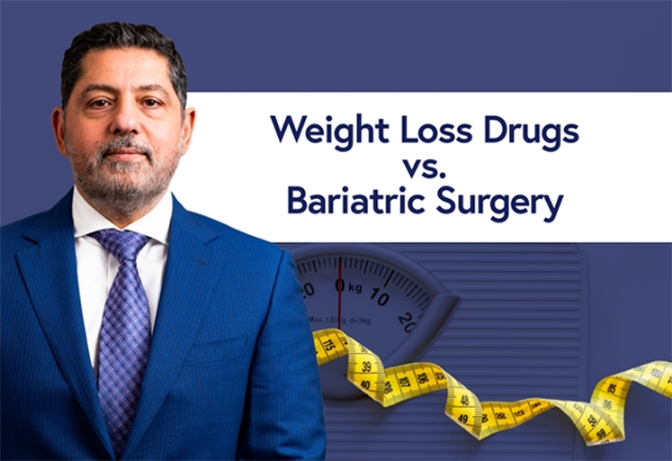Weight Loss Drugs vs. Bariatric Surgery – Which is Right For You?
If you’re trying to lose weight and finding it difficult, you may have considered taking medications or undergoing bariatric surgery. Both of these... read more
Call Us Today (732) 640-5316
E-Waiting RoomThere is no single right answer for all patients. The choice of procedure is a personal decision. When you satisfy the medical criteria for weight loss surgery and are committed to making lifestyle changes, you will lose weight and keep it off. There are three common choices: gastric sleeve, gastric bypass and Adjustable lap band. All procedures provide the benefits of weight reduction and resolution of co-morbid conditions such as type 2 diabetes and reduced cardiovascular risk and overall mortality. Common risks include nutritional deficiencies, GERD, bowel obstruction, dumping syndrome (diarrhea, nausea and vomiting), gall stones, hernias, low blood sugar, and malnutrition. Surgical risks include adverse reactions to anesthesia, blood clots, breathing problems, and infection. Bariatric surgery is major surgery.
LSG surgery is newer and is best for people with a BMI of at least 40 but may be offered with to patients with a BMI of 35 who have a serious medical condition like type 2 diabetes or heart disease, that can be treated or reversed with weight loss surgery. LSG involves the removal of up to 80% of the stomach volume and the creation of a small sleeve-shaped stomach using staples. The result is restricted food intake, less hunger and faster digestion. LSG resets the metabolic system which increases metabolism and treats hormone changes that facilitate weight loss. You may go home the day after surgery. Recovery takes about 3-5 weeks.
You can expect to lose 53.25% of your excess weight at five years after surgery and sustainable weight loss over the long term (10 year or more).
Complications include abdominal pain, leakage of stomach contents, stricture, fatigue, bloating, dumping syndrome, scarring that can lead to a bowel blockage, narrowing at the middle of the stomach which may require stretching, inflammation, and gall bladder disease. If revision is necessary, gastric bypass surgery is the choice.
Advanced surgical is great. They did my surgery although another surgeon wouldn't as she said my hernia was too big. I am 10 months out and lost 56 lbs. I feel great and I'm off my medications. I have 30lbs to my goal weight but I will get there. The staff is terrific. I couldn't ask for anything better.
Sharon J.LGB surgery is widely used to treat morbid obesity because it offers the greatest amount of weight loss. This surgery involves changing how your food is treated in the stomach and small intestines. First, the stomach is made smaller using staples, which creates a pouch the size of a walnut that can hold only about 1 oz. of food. The second step is the bypass where the surgeon connects a small part of the small intestines to a small hole in the stomach pouch. When you eat food passes into the small intestines faster which means you absorb fewer calories. A short hospital stay is needed, but recovery is relatively fast
You can expect to lose 63% of your excess weight at five years and which is sustainable over the long term (10 year or more).
Early postoperative serious complications include leak, obstruction and hemorrhage. The most serious is a leak but this affects less than 5% of patients. Bowel obstruction occurs in less than 5% of patients, similar to other abdominal and pelvic surgeries. Hemorrhage occurs in less than 1% of all bypass patients. Dumping syndrome is expected in the first few months after surgery. Long term complications can result in reoperation in 3-20% of cases. 10-15% of patients fail to achieve weight loss goals or regain weight after bypass surgery.
Adjustable lap band surgery involves inserting a silicone band around the upper part of the stomach which decreases the size of the stomach and restricts the amount of food you can eat until you are full. It is minimally invasive and is reversable and adjustable. Adjustments can be made in the doctor’s office. This is often an outpatient procedure.
Weight loss is slower than with other surgical procedures. You can expect to lose about 50% of your excess weight at two years and sustain that weight loss over the long term (10 year or more). After the procedure you can expect to be able to eat no more than 3/4ths of a cup of food. If you try to eat more, you can become nauseous and vomit.
LALB is effective at inducing weight loss and improving comorbid conditions. This procedure poses fewer risks than gastric sleeve and bypass. Long term complications include slipping of the band or mechanical problems, band erosion, and infection. Some complications can be managed in the office. However, LALB fails in 20-60% of cases either due to insufficient weight loss and/or complications. In that case, revision surgery may be necessary. After failed a LALB, revisional surgery options include laparoscopic gastric bypass and gastric sleeve. Revisional surgery with either procedure is safe and effective, but gastric bypass surgery ensures greater weight loss at 24-month follow-up.
Your surgeon at Advanced Surgical and Bariatric of New Jersey, will discuss all your goals and options with you and make recommendations, so that you can make an informed choice about what is right for you.

Dr. Ragui Sadek is a premier surgeon who established a state-of-the-art and one of the safest bariatric surgery programs in the state. Dr. Sadek has fellowship training in both laparoscopic/bariatric surgery and surgical trauma/critical care, allowing him to safely perform complex surgeries on patients who have been turned down by other practices. As a Clinical Assistant Professor of surgery at RWJ Medical School & the Director of bariatric surgery program at RWJ University Hospital, Dr. Sadek offers a cutting-edge range of laparoscopic, robotic, & bariatric surgical procedures with a complication rate substantially below the national average.
Dr. Sadek is a Clinical Assistant Professor of Surgery at Rutgers-Robert Wood Johnson Medical School and a Fellow of the American College of Surgeons. Having performed more than three thousand advanced surgical procedures, Dr. Sadek has established a strong patient satisfaction rate and a solid reputation among the surgical community and is renowned as a top physician in his field by International Association of Healthcare Professionals. As a board-certified surgeon, he holds affiliations with the American Society of Metabolic and Bariatric Surgery and the Society of American Gastro Endoscopic Surgeons. More about Dr. Sadek
Stay current with Advanced Surgical & Bariatrics of New Jersey

If you’re trying to lose weight and finding it difficult, you may have considered taking medications or undergoing bariatric surgery. Both of these... read more

Are you frustrated with your inability to lose weight? Tired of being trapped in an endless cycle of yo-yo dieting, over-exercising, cleanses, and... read more